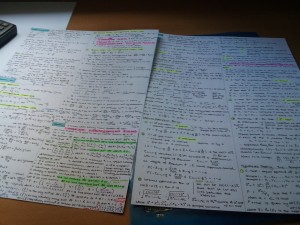– By Phoebe Yee, Director of Brain Matter
When I was studying mathematics as my Major in NUS, one of my fondest memories of my math exam is the CHEAT SHEET. For most of the math exams in NUS, students are allowed to bring in a piece of A4 paper into the examination hall. This piece of paper (which we called CHEAT SHEET) is the lifeline for most of us students as it contains all the mathematical formulae or even examples and answers from lecture notes. In short, you can write on that A4 paper just anything you think will help you for the exams. I remember how I hated writing cheat sheets because it would take me hours to write and squeeze my tiny words and numbers into a blank piece of white paper, which was later, transformed into a very colorful piece of ‘artwork’. But I must say it has helped me a great deal because it forced me to revise as I write down my notes. And, especially when I spotted the right questions from my lecture notes and copied the answers down on my cheat sheet. Oh, that thought of Lady Luck smiling upon me!
As compared to University Level, Secondary Level math is definitely more manageable and predictable. Remember the Bell Curve that I showed you in the last article? Most questions will fall into 3 categories: The Easy, The Standard (Majority of the questions) and The Challenging. Questions from The Easy and Standard category will not differ much and the smart thing we can do is to make sure we master the art of answering those questions. When I say that the questions don’t differ much, I mean questions of those type will not change in their question approach. Sometimes, we call them the typical questions with just a change in the values of the variables. By understanding this, we will be able to prepare ourselves to excel.
“If you know the enemy and know yourself, you need not fear the result of a hundred battles. If you know yourself but not the enemy, for every victory gained you will also suffer a defeat. If you know neither the enemy nor yourself, you will succumb in every battle.” – Sun Tzu, The Art of War
It’s not about bashing through the ‘war’ called math exams by doing many questions and making the same mistakes. But it is about knowing yourself and the nature of the paper/topics. That will give you the greatest victory.
Check out our Resource Page for an example of a Cheat Sheet in Binomial Theorem.

